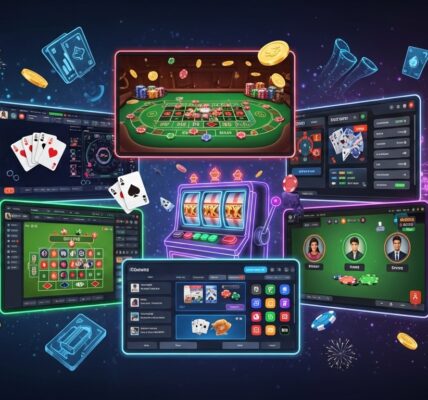Introduction: The Digital Revolution of iGaming
In the last two decades, the entertainment industry has undergone a massive transformation, and one of the most dynamic sectors leading this evolution is iGaming. The term iGaming refers to any form of online gambling that involves betting on the outcome of games or events through the internet. This includes online casinos, poker rooms, sports betting, bingo, and lotteries. The iGaming industry has become a global powerhouse, worth billions of dollars, attracting players from every corner of the world. It combines the thrill of traditional gambling with the accessibility and innovation of modern technology.
This blog explores the world of iGaming — its history, growth, technological foundations, cultural impact, and the future it holds. Whether you are a curious newcomer or a passionate enthusiast, understanding the scale and sophistication of iGaming gives a glimpse into how digital entertainment continues to redefine how people play and interact across the globe.
The Origins of iGaming: From Casinos to the Cloud
Before the internet, gambling was primarily confined to physical spaces — casinos, racetracks, and gaming parlors. These venues were glamorous yet exclusive, often limited by geography and accessibility. The idea of bringing gambling to the digital space began in the mid-1990s, around the same time that online shopping and digital banking began to gain traction.
The first online casino launched in 1994 after the Caribbean nation of Antigua and Barbuda passed the Free Trade and Processing Act, which allowed companies to obtain licenses for online gambling. Initially, these online platforms were simple, with basic graphics and limited games like blackjack and roulette. However, they represented something revolutionary: the ability to place bets without being physically present in a casino.
By the early 2000s, improvements in internet connectivity, online payment systems, and security measures encouraged more people to participate. The stage was set for an industry that would eventually outpace traditional gambling in both reach and revenue.
The Role of Technology in iGaming’s Growth
The success of iGaming is inseparable from the rapid development of technology. Every innovation in connectivity, software, and security has pushed the boundaries of what online gambling can offer.
1. Internet and Mobile Access:
The shift from dial-up connections to broadband — and later to mobile internet — transformed iGaming. Players could now access platforms on their phones, tablets, or laptops anytime, anywhere. The convenience of mobile apps has made iGaming more accessible than ever before, appealing to both casual and serious players alike.
2. Random Number Generators (RNGs):
One of the most critical aspects of iGaming is fairness. Random Number Generators ensure that game outcomes are unpredictable and unbiased. This technology replicates the randomness of real-life gambling and builds trust among players.
3. Artificial Intelligence and Personalization:
AI technology in iGaming analyzes player behavior to offer customized experiences. It can recommend games, manage responsible gaming settings, and even detect potential fraud. AI chatbots also assist users in real-time, enhancing customer support and user engagement.
4. Blockchain and Cryptocurrency:
Blockchain technology introduced transparency and anonymity to iGaming. Some platforms allow players to deposit and withdraw using cryptocurrencies like Bitcoin or Ethereum, offering faster transactions and enhanced privacy. Blockchain also provides tamper-proof records of every transaction, ensuring fairness and accountability.
The Psychology Behind iGaming’s Appeal
iGaming isn’t just about luck and money; it’s about human psychology. The thrill of unpredictability, the excitement of potential reward, and the instant gratification of online play all contribute to its massive popularity.
1. The Reward System:
Games in the iGaming sector are designed around the human brain’s reward system. Visual and auditory stimuli like flashing lights, winning sounds, and celebratory animations trigger dopamine release, making players feel exhilarated and motivated to continue playing.
2. Accessibility and Convenience:
Unlike traditional casinos that require travel and dress codes, iGaming platforms are available 24/7. Players can join a poker table or spin a slot reel from the comfort of their homes or during a short break at work.
3. Social Interaction:
Many iGaming platforms now integrate social features, allowing players to chat, compete in tournaments, or share achievements. This sense of community adds another layer of engagement, turning online gambling into a social experience rather than a solitary one.
Popular Categories in iGaming
The iGaming world is vast, covering a variety of gaming formats that appeal to different audiences.
1. Online Casinos:
Virtual casinos remain the cornerstone of iGaming. They replicate the experience of traditional casinos with a wide selection of games such as slots, blackjack, roulette, and baccarat. Live dealer games, where real human dealers stream from studios, have further blurred the line between digital and physical gambling.
2. Sports Betting:
Sports betting has exploded in popularity, especially with the integration of real-time data and analytics. Players can place bets on almost any sport, from football and cricket to esports and virtual sports. In-play betting allows users to wager while the event is happening, adding layers of excitement.
3. Online Poker:
Poker remains a timeless classic in the iGaming world. With online platforms, players from across the globe can compete in real-time tournaments with massive prize pools. The game’s blend of strategy and chance makes it especially captivating.
4. Esports Betting:
Esports betting has become a significant segment, with millions of viewers placing bets on competitive gaming events. Games like League of Legends, Dota 2, and Counter-Strike have developed global fanbases that rival traditional sports audiences.
5. Bingo and Lotteries:
Modern bingo platforms combine classic gameplay with social features, chat rooms, and themed rooms. Similarly, online lotteries make it possible for players to participate in global draws from any location.
Regulation and Responsible Gaming
The iGaming industry’s explosive growth has prompted governments and regulatory bodies to establish frameworks to protect players and ensure fairness. Licensing authorities monitor everything from payout percentages to advertising standards.
1. Licensing and Compliance:
Jurisdictions such as Malta, the Isle of Man, and Gibraltar have become global hubs for iGaming licensing. Operators must adhere to strict regulations regarding game fairness, data security, and financial transparency.
2. Responsible Gambling Measures:
Reputable platforms promote responsible gaming by offering self-exclusion tools, deposit limits, and real-time monitoring to prevent addiction. Awareness campaigns and partnerships with mental health organizations have become central to the industry’s ethical development.
The Rise of Live Dealer Games
Live dealer games are one of the most remarkable innovations in iGaming. They merge the immersive experience of land-based casinos with the convenience of online platforms. Players can interact with real dealers through high-definition video streams, chat in real time, and watch cards being shuffled or roulette wheels spun.
This hybrid approach satisfies both the need for authenticity and the demand for digital accessibility. The success of live dealer gaming has also inspired the development of virtual reality casinos, where players can explore 3D environments and interact using VR headsets.
The Impact of iGaming on Global Economies
The iGaming industry contributes significantly to the global economy through taxation, employment, and technological innovation.
1. Economic Contributions:
Countries with regulated markets generate billions in tax revenue each year. These funds often go toward public welfare, infrastructure, and social programs.
2. Employment Opportunities:
From software development to marketing and customer support, the iGaming sector provides jobs for thousands of professionals worldwide. The growing demand for specialists in cybersecurity, game design, and data analysis continues to drive job creation.
3. Technological Innovation:
Many technologies used in iGaming — such as secure payment gateways, streaming solutions, and gamification techniques — are later adopted in other industries. Thus, iGaming acts as a testing ground for emerging digital technologies.
Challenges Facing the iGaming Industry
While the industry continues to thrive, it faces several challenges that could shape its future.
1. Legal Uncertainty:
Different countries have varying laws regarding online gambling. Some regions embrace it fully, while others impose strict bans. Navigating these legal complexities remains a challenge for global operators.
2. Cybersecurity Threats:
As with any online industry, iGaming platforms are targets for cyberattacks. Protecting user data, preventing fraud, and ensuring secure payment systems are ongoing concerns.
3. Addiction and Social Concerns:
Gambling addiction remains one of the biggest issues tied to iGaming. Ensuring that entertainment does not turn into dependency requires ongoing effort from operators, regulators, and mental health organizations.
The Future of iGaming: Innovation and Integration
The iGaming landscape is constantly evolving. As new technologies emerge, the boundaries of possibility continue to expand.
1. Virtual Reality and Augmented Reality:
VR and AR are transforming user experiences. Virtual casinos, interactive poker rooms, and 3D sports betting environments allow players to immerse themselves like never before.
2. Artificial Intelligence Evolution:
AI will continue to enhance personalization, improve fraud detection, and create smarter customer support systems. It will also help identify problematic behaviors to promote responsible gaming.
3. Cross-Platform Integration:
As gaming becomes more interconnected, players will soon move seamlessly between devices and gaming platforms. Unified accounts and cloud-based gaming will make transitions effortless.
4. Social and Community Play:
Future iGaming will emphasize community-driven play, enabling tournaments, leaderboards, and cooperative games where players can form alliances or compete globally.
Conclusion: iGaming as the Future of Digital Entertainment
iGaming has become one of the most influential industries in the modern entertainment ecosystem. Its combination of technology, psychology, and social interaction has created a unique space where people can experience excitement, strategy, and community — all from their devices.
As technology continues to advance, the future of iGaming looks brighter than ever. With innovations like virtual reality, blockchain integration, and artificial intelligence, the industry will continue to redefine digital leisure and expand the limits of what’s possible.
At its core, iGaming is not just about betting or winning; it’s about experiencing the thrill of chance, the joy of play, and the boundless potential of human creativity in the digital era





